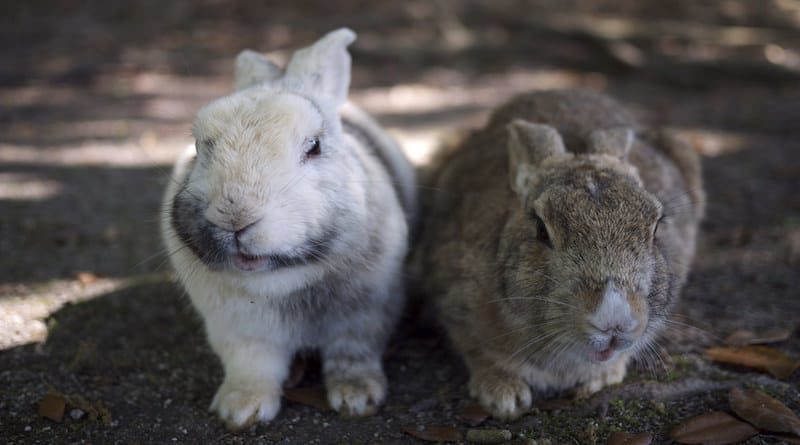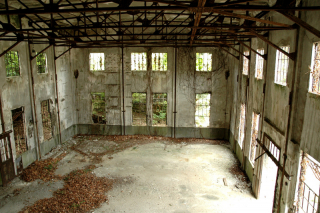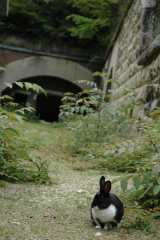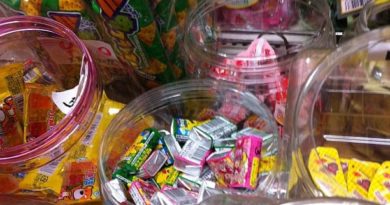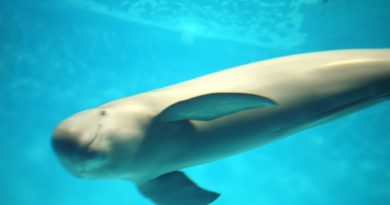Okunoshima “Rabbit Island”
It’s not due to the shape of this island that it got the nickname of Rabbit Island, but because it is completely overrun with the cute, fluffy bunnies. There are conflicting accounts as to how the bunny population began, but there are now between 700 and 900 rabbits living wild on the island and they are now Okunoshima’s main attraction.
Where did the bunnies on Rabbit Island come from?
Scroll to the bottom of this page for the Tadanoumi-Okunoshima ferry schedule.
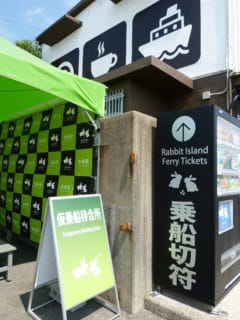 Located about an hour’s drive past Kure from Hiroshima city is the island of Okunoshima. The island is now a popular day-trip destination or weekend holiday spot. When you arrive in Tadanoumi, there is now a great little port which has a small shop where you can buy a variety of rabbit souvenirs, rabbit food to feed the bunnies and ice-cream and other light snacks to feed the people.
Located about an hour’s drive past Kure from Hiroshima city is the island of Okunoshima. The island is now a popular day-trip destination or weekend holiday spot. When you arrive in Tadanoumi, there is now a great little port which has a small shop where you can buy a variety of rabbit souvenirs, rabbit food to feed the bunnies and ice-cream and other light snacks to feed the people.
There is a good sized hotel (resort) with hot spring bath, restaurant, pool (in summer) cycle and walking paths, kid-friendly museum and it is also possible to visit the abandoned site of the chemical factory if you are interested. On a visit in late summer of 2016, we wandered around the whole island on foot, feeding bunnies and catching Pokemon along the way (they are pretty good at posing for pictures with the rabbits before you capture them!) #RabbitIslandPokemon
Despite the beautiful, family-friendly view of the island and its surroundings. The island’s wartime history was quite different. For the 16 years it was operating, the island was kept off maps and residents told to keep its poison gas factories secret. There are also abandoned barracks in the hills which were storage facilities for weapons and ammunitions- these areas are all clearly labeled and their history described on boards in both English and Japanese.
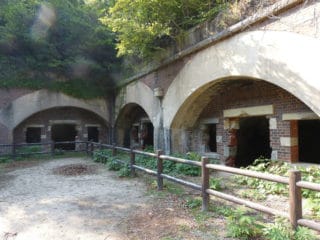 According to this Japan Times article, the island produced 5 types of chemical gas which was mostly used in warfare in China. While working at the factory, many workers, which included Junior High School aged children who were forced to work during the war effort, also died during manufacturing. Some have argued the island might not be completely safe as there has never been any major decontamination of the whole island and there are apparently some sealed locations remaining which may still have poison stored in it. So, perhaps it’s best to stay on the official walkways and paths on the island.
According to this Japan Times article, the island produced 5 types of chemical gas which was mostly used in warfare in China. While working at the factory, many workers, which included Junior High School aged children who were forced to work during the war effort, also died during manufacturing. Some have argued the island might not be completely safe as there has never been any major decontamination of the whole island and there are apparently some sealed locations remaining which may still have poison stored in it. So, perhaps it’s best to stay on the official walkways and paths on the island.
The hotel information, museum staff, tourist information and local government do not mention any remaining problems and advertise the island as completely safe. As more visitors come to the island, we can hope the government is making more effort to maintain visitor safety. This is another reason to enjoy all the healthy bunnies jumping around the island. If you do notice any rabbits that are sick, please make sure to notify any of the staff who work in the hotel or at the port.
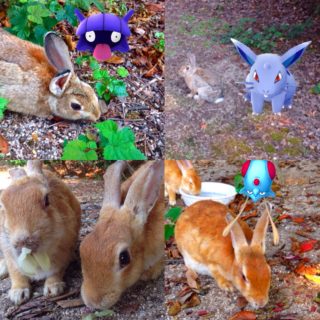 Walking around the lush island enjoying the beautiful Seto Inland Sea views is a day you will enjoy. There is a family friendly nature museum full of fun activities for the kids. The main Okunoshima resort is a good resource while on the island. The lobby has a Japanese set-meals restaurant, small meals and light snacks and desserts cafe where you can buy rabbit snot ice-cream (some kind of chocolate candy that looks like rabbit droppings is put on top of the soft-whip). The small gift shop in the lobby has snacks and souvenirs and the front desk can arrange a variety of activities on the island to enjoy from walking trails to bicycle rental to other sports like tennis. There is also a free regular shuttle from the hotel to the port throughout the day.
Walking around the lush island enjoying the beautiful Seto Inland Sea views is a day you will enjoy. There is a family friendly nature museum full of fun activities for the kids. The main Okunoshima resort is a good resource while on the island. The lobby has a Japanese set-meals restaurant, small meals and light snacks and desserts cafe where you can buy rabbit snot ice-cream (some kind of chocolate candy that looks like rabbit droppings is put on top of the soft-whip). The small gift shop in the lobby has snacks and souvenirs and the front desk can arrange a variety of activities on the island to enjoy from walking trails to bicycle rental to other sports like tennis. There is also a free regular shuttle from the hotel to the port throughout the day.
Rabbit food is no longer sold on the island (get yours from the Tadanoumi port). Although we did find that the rabbits preferred cabbage leaves and carrots which we had brought from home- be careful to only feed them fresh vegetables folks, no cooked or processed foods, as these are vegetarian animals. They are also wild animals, so it is not recommended to try to pet or hold them. It was fun for all of us to feed the fluffy little bunnies, not annoying like the deer on Miyajima island that are only cute until you have food in your hand. I am always impressed at each visit that they seem very well fed and protected by both the residents and visitors to the island.
The Kyukamura National Park Resort Okunoshima website has information about walking tours and rentals available on the island as well as hotel rooms, food deals and other services.
This Japan Times article on wartime history of the island by Eric Johnston outlines the history of the chemical making during wartime and poses questions on the current safety of the island. Another interesting piece on the island comes from a traveler writing for Coilhouse. A favorite is this beautifully written review by a travel writer for Metropolis online magazine.
How to get to Rabbit Island:
Okunoshima is a 15 minute ferry ride from Tadanoumi Port (Adult ¥300, Children ¥150 one way) with boats leaving about every half hour 07:45-19:30. The port is a short 5 minute walk from Tadanoumi JR Station which is half way between Takehara and Mihara on the Kure Line (it takes about 2 hours by local train from Hiroshima and costs around ¥1280-¥1500 one way).
View Okunoshima “Rabbit Island” in a larger map
Tadanoumi to Okounoshima “Rabbit Island” Ferry Schedule (Updated August 2017)
| Service | Tadanoumi 忠海 |
Okunoshima 大久野島 |
Sakari 盛 |
| Cruiser | 07:40 | 07:55 | — |
| Ferry | 08:30 | 08:45 | 09:00 |
| Cruiser | 08:40 | 08:55 | — |
| Ferry | 09:40 | 09:55 | 10:10 |
| Cruiser | 10:25 | 10:40 | — |
| Ferry | 10:50 | 11:05 | 11:20 |
| Cruiser Sat, Sun, Hols |
11:30 | 11:45 | — |
| Ferry | 12:00 | 12:15 | 12:30 |
| Cruiser Sat, Sun, Hols |
12:20 | 12:35 | — |
| Cruiser Sat, Sun, Hols |
13:45 | 14:00 | — |
| Ferry | 14:05 | 14:19 | 14:35 |
| Cruiser | 15:00 | 15:15 | — |
| Ferry | 15:15 | 15:29 | 15:45 |
| Cruiser | 16:00 | 16:15 | — |
| Ferry | 16:25 | 16:39 | 16:55 |
| Cruiser | 17:50 | 18:05 | — |
| High speed ferry | 18:40 | 18:55 | — |
Okunoshima “Rabbit Island” to Tadanoumi Ferry Schedule
| Service | Sakari 盛 |
Okunoshima 大久野島 |
Tadanoumi 忠海 |
| Cruiser | — | 08:10 | 08:25 |
| Cruiser | — | 09:10 | 09:25 |
| Ferry | 09:05 | 09:20 | 09:35 |
| Ferry | 10:15 | 10:30 | 10:45 |
| Cruiser | — | 10:50 | 11:05 |
| Ferry | 11:25 | 11:40 | 11:55 |
| Cruiser Sat, Sun, Hols |
— | 11:55 | 12:10 |
| Cruiser Sat, Sun, Hols |
— | 12:45 | 13:00 |
| Ferry | 13:35 | 13:48 | 14:00 |
| Cruiser Sat, Sun, Hols |
— | 14:25 | 14:40 |
| Ferry | 14:40 | 14:56 | 15:10 |
| Cruiser | — | 15:35 | 15:50 |
| Ferry | 15:50 | 16:06 | 16:20 |
| Cruiser Sat, Sun, Hols |
— | 16:30 | 16:45 |
| Ferry | 17:00 | 17:16 (February to October only) |
17:30 |
| Cruiser | — | 18:15 | 18:30 |
| Cruiser | — | 19:15 | 19:30 |
Ferries go on to Sakari Port on Omishima Island after calling at Okunoshima. Return ferries originate from Sakari Port on Omishima Island. Additional services my be added on particularly busy days. Ferry schedules do change fairly often so please confirm times on this page (in English via Google Translate here) or by calling the Sanyo Shosen Tadanoumi office on (0846)22-6199.


